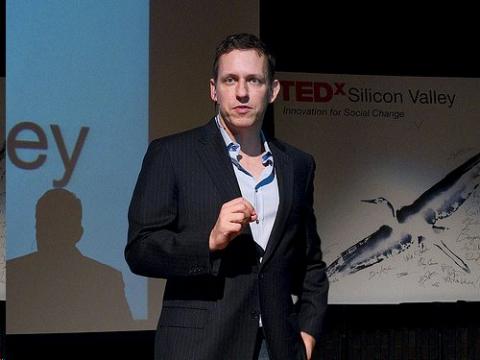The Fellowship of the Thiel

The brainchild of PayPal co-founder Peter Thiel, the Thiel Fellowship promises to give the world’s brightest minds under 20 the opportunity to “pursue innovative scientific and technical projects, learn entrepreneurship, and begin to build the technology companies of tomorrow.”
To help them along their two-year foray into the tumultuous world of product development and Silicon Valley investors, fellows are given $100,000 and access to an enviable network of contacts. In exchange, fellows take a leave of absence from college to become full-time inventors and entrepreneurs.
The idea of the Thiel fellows begs a serious question: Will an ambition-based meritocracy upend our experience-based gerontocracy? And is this a passing trend or a lasting order?
The fellowship has brought up a mixed media reaction with a heavy focus on the mandatory college “stop out” required of all recipients. New York Magazine devoted a feature to questioning the necessity of the college degree. ABC’s Nightline asked, “Who needs college?”
To the fellows interviewed for Highbrow Magazine, the decision to leave school was a matter of opportunity cost. “I was just more passionate about my company”, said Gary Kurek, a 19 year-old fellow who founded his own mobility aids company. Kurek turned down a full scholarship to a prestigious engineering school in Canada to work on building his company. He heard about the Thiel Fellowship afterwards and thought it was a good fit for him. “I felt I learned far more by applying my skills out in the real world versus learning in the classroom. I just felt I should continue down that road.”
Kurek was just one of the fellows who made his decision to drop out or delay college independently of fellowship requirements. For Dale Stephens, a 19 year-old fellow, the latent opportunity cost of college led him to a similar conclusion. Stephens is the founder and “Chief Educational Deviant” behind UnCollege, which he describes as a “social movement” designed to question the premise behind a traditional undergraduate education.
Stephens left college before he even received the fellowship. “It wasn’t a snap decision,” he explained, but “a gradual process.” He founded UnCollege in January 2011 and dropped out the following month. “When I was at college, I saw a gap between theory and application,” Stephens said in an interview. “There were smart people writing research papers, not changing the world… I guess I’m the sort of person who likes to see direct results.”
In many ways, the central tenets of Stephens’ project parallel those of the Thiel Fellowship. On CNN’s American Morning, Thiel explained the rationale behind this endeavor. “Starting a business is something that is a full-time thing. It’s like going for the Olympics or working on some intense project. It’s not something you do in parallel with school…we think whenever people have the passion or desire to do so, they should get started.”
Unlike his 20-under-20 fellows, Thiel founded his billion-dollar brainchild at the seasoned age of 31 after earning a B.A. from Stanford and J.D. from Stanford Law. His second claim to fame is being the first outside investor in Facebook, a smart investment decision that also earned him a role in 2010’s The Social Network. In his work, Thiel has served less as a poster child for the drop-out movement than as a mentor and advocate.
With the added support of Thiel and his network, Dale Stephens wants to encourage a similar mindset, a focus on the “realization of potential” among the frustrated undergrads of the country. “It’s very easy to trichotomize life to three choices,” Stephens said. “(A) Go to college, (B) Drop out of college and become Bill Gates, or (C) Spend the rest of your life asking, would you like fries with that?” Neither of these “traditional” choices appealed to Stephens, who explained, “I’m not looking to strike it big. I define success in terms of the impact I have on others.”
Unlike Kurek or Stephens, Darren Zhu decided to take time off from college as a result of the fellowship. A sophomore at Yale, Zhu said he felt “a lack of a challenging, entrepreneurial environment” and decided to take a chance with Thiel. For Zhu, age 20, the Thiel resources will be used to build a start-up in the field of synthetic biology. As he describes it, “It’s a relatively new field of science. The general idea is to re-engineer microorganisms with different pathways and different functions.”
While it is tempting to adopt a monomaniac attitude towards the age of the fellows or their college enrollment, there is a risk that comes with ignoring the more humanistic factors that predict success. When asked what qualities they believed were essential for the success of young entrepreneurs, the fellows presented a spectrum of possibilities.
For Kurek, the answer was persistence. “I see too many people who change their minds too fast and don’t give something a chance. They don’t wait things out, let them happen. You have to live through something in good times and bad. Not everything’s going to be roses.”
Stephens was an advocate for autonomy. He recounted an anecdote about talking with a Thiel finalist who hadn’t received the fellowship. The finalist regretted not getting the fellowship because he knew it was the only reason that his parents would consider valid enough to leave school. Stephens believed that that sort of attitude was what prevented the finalist from getting the fellowship.
Zhu cited “daring” coupled with “the boldness to believe that there are consumers who value your product and idea.”
Persistence, autonomy, and daring. Growing pains required?




























































































































































































































































































































